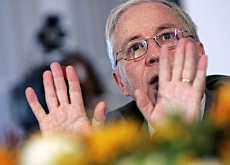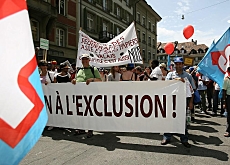Blocher says asylum policy is working

Justice Minister Christoph Blocher has revealed that fewer rejected asylum seekers are staying in Switzerland since their social welfare was cut two years ago.
Blocher’s announcement comes ahead of a referendum on September 24 on stricter asylum measures.
Blocher, from the rightwing Swiss People’s Party, said the policy had achieved its target of reducing the number of asylum seekers making groundless applications. He said the number of asylum seekers had dropped by 12.5 per cent and that SFr92 million ($75 million) had been saved.
He added that there was no evidence of an increased number of rejected asylum seekers going underground, or that they had been forced into crime.
Since April 1, 2004 asylum seekers have only received aid in emergency cases. Between April 1, 2004 and March 31, 2006 two-thirds of rejected asylum seekers received no emergency welfare payments.
According to the second report since social welfare payments were stopped, 2,235 asylum-seekers were rejected last year, compared with 4,450 during 2004.
Blocher added that the new law would not affect the admission of refugees and that the situation of vulnerable people would still be taken into account.
Criticism
But Jürg Schertenleib, the Swiss Refugee Council’s legal expert, was unimpressed with Blocher’s comments that the tighter asylum policy was working.
“It depends what you mean by working – he says two-thirds of rejected asylum seekers have left Switzerland but there’s no way of knowing this. On the contrary, we believe most of them are still in Switzerland,” he told swissinfo.
“Secondly, he says there haven’t been problems with this new policy, but some cantons have refused to give food to asylum seekers and some of the shelter offered, including to children, has not been acceptable.”
As for the SFr92 million that Blocher claims has been saved, Schertenleib says: “The price of this money is human dignity, so I don’t consider this good news.”
Poll
According to an Isopublic poll at the weekend, around 43 per cent of the electorate are in favour of tightening Switzerland’s asylum law.
The new law was approved by parliament last December but will be decided in a referendum next month after being challenged by a coalition of centre-left parties, church groups and aid organisations.
They are opposed to the stricter measures including the cutting of social welfare payments to asylum seekers and the raising of the maximum detention for foreigners awaiting deportation to 18 months.
The plan also rules out the granting of admission to asylum seekers on humanitarian grounds, but will make it easier for those accepted to work and to be joined by their families.
swissinfo with agencies
Asylum seeker requests:
1970s: 1,000-3,000 per year.
1991: 41,000 (mainly due to crises in the Middle East, Sri Lanka and in the former Yugoslavia)
2000: 18,500
2005: 10,061 (-30% from 2004, and the lowest number since 1986)
Main asylum seeker countries in 2005: Serbia and Montenegro, Turkey and Somalia.
Just under 95,000 foreigners (including 993 recognised refugees) migrated to Switzerland last year, slightly fewer than in 2004.
Foreigners constitute more than 20% of the Swiss population of seven million.
Under the revised asylum law, rejected asylum seekers would no longer receive social welfare payments and the maximum detention period for foreigners awaiting deportation would be raised to 18 months.
The granting of admission on humanitarian grounds has been ruled out. But it has been made easier for those granted asylum to be joined by their families and to work.
Also to be voted on in September will be a revision to Switzerland’s immigration law, called the Foreigners National Act, which favours EU and Efta nationals and limits the migration of non-European and unqualified workers.
Both laws were approved by parliament last December, but face a nationwide vote on September 24.

In compliance with the JTI standards
More: SWI swissinfo.ch certified by the Journalism Trust Initiative



You can find an overview of ongoing debates with our journalists here. Please join us!
If you want to start a conversation about a topic raised in this article or want to report factual errors, email us at english@swissinfo.ch.